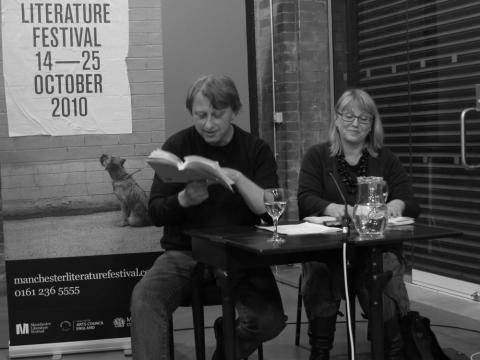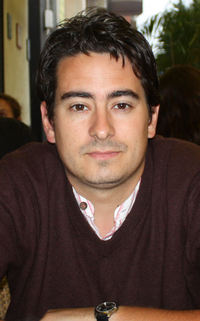Jáchym Topol: I don't have answers, I have a novel
“The serious answers to serious questions are in my books,” Jáchym Topol, the noted Czech writer, tells the audience at Manchester's annual literature festival, where he is giving a reading from Gargling with Tar, his latest novel to be published in English.
“All I have to say is here. I don't enjoy writing tours – for a writer it is better to be alone.”
Topol is accompanied at the event – held at The International Anthony Burgess Foundation – by his younger brother, Filip, a musician and songwriter for the popular Czech-rock group Psi Voyáci (Dog Soldiers). Filip performs first, showcasing his talent on the piano and singing in his native Czech. Jáchym then takes the stage, answering questions and reading from Gargling with Tar.
He is charming, humorous and, surprisingly, given his reputation for privacy, personally revealing. “I read A Clockwork Orange when I was 16,” he says to the audience, connecting the event's locale to his own life. “It was an illegal translation, typed up on carbon paper. The book was forbidden in my country. I was shocked and scared by the use of Russian words. I thought, ‘this British man (Burgess) really thinks this is our future.' A bizarre point of view, how I read him: as a prophet of the apocalypse.”
It is not surprising that Topol's writing explores the tumultuous history of his native land. Born in 1962, he was six when the Soviet-led Warsaw Pact armies invaded Czechoslovakia in August 1968. By then communist for twenty years, the country underwent a short period of liberalization from early '68, under the reform-driven presidency of Alexander DubÄÂçek. Seen as a threat by the Soviet Union, the Warsaw Pact invasion repressed the liberal reforms and normalized Czechoslovakia back into the Soviet-bloc.
While Gargling with Tar is set during the ‘68 invasion, Topol is keen to stress that it was during the later years that life in Czechoslovakia became unbearable. “After the invasion we lived in a state of humiliation,” he explains. “It took a year for things in the country to shut down, in the 1970s the real repression started.” Within this climate of oppression rose an active underground movement that included Jáchym and Filip and a generation of other fighters who operated clandestinely in Czechoslovakia against the regime.
Jáchym, the youngest signatory of the human rights initiative Charter 77, was frequently interrogated (and later imprisoned) in the 80's for his opposition, including involvement in samizdat publishing, and co-founding “illegal” publications to give voice to new Czech literature.
Despite its historical context, Topol stresses that Gargling with Tar is an exaggerated and largely inaccurate account of the invasion. “It's also a joke,” he makes clear. “The uprising is an irony.” As such, the novel's main character, a young orphaned boy named Ilya, is enlisted into the defense force, only later to switch sides when he accidentally encounters the much larger Soviet forces. Topol adds wryly: “I'm very proud of how many armies were sent to the Czech lands. I know through historical books that it was the second largest tank invasion since the Battle of Kursk.”
While Topol says he does not want to be the conscience of a country (“I write for myself, to understand history”), it is clear he writes with a personal conscience – an empathy with what Czechs underwent during the most repressive communist years, and with the suffering caused by social and political upheaval in the region as a whole. Due to this, his work often appears to provide a service to memory and truth, preserving it for those who were not there at the time.
“I don't have answers, I have a novel,” he says, as his conversation with the audience draws to a close. “When I was young, history was a weapon....I fought for freedom, but now I feel like a censor. I am very lucky though. This book was appreciated by readers and even won an award.”
Once the event is over, Topol takes a moment to answer remaining questions and sign copies of his novel. After a quick break for a cigar (“I'm trying to quit,” he muses apologetically), he moves to the Burgess Centre's library, a combination of archive, study space and museum. Continuing where the group discussion ended, he begins, “I have a naive understanding of history. In 1968 I saw photographs of student riots in France, hippies in the West having a good time . . . Not for us. I wrongly assumed it was like this in Czechoslovakia. The small boy's tale is phantasm-logical.” In that respect, Gargling with Tar expertly employs surreal metaphors and hallucinatory reflections.
Perhaps (for the English reader) the most confounding aspect of the novel is the traveling circus that accompanies the invading Warsaw Pact forces. “The circus is a good metaphor, based on reality,” Topol explains. “In the Soviet Union, the circus was popular. Other art and forms of expression were restricted. The circus was not – it was a gift to the people as entertainment. It was easy to join the circus; like gypsy culture the circus offered a possibility of escape.”
At the forefront of post-1989 Czech literature, Topol's books are known and read across Europe. Gargling with Tar itself has received French, Polish, Dutch, German, Italian, Hungarian and Norwegian translations. For a novel that concerns such a specific period of history, it is testament to Topol's talent that he enjoys such a wide readership. When asked if it was his intention to inform foreign readers of the 1968 invasion, as with the younger generation of Czechs, he responds, “No, there is little understanding of Czech history in the West. Being an author gives me the license to write something creative.”
Topol's only other novel translated into English is his first, City, Sister, Silver. Published in 1994, it took six years to reach the English language market. For him, this is an irritating aspect of being a writer. “When your books are translated,” he says, “you find yourself answering questions about a work which was written years ago – it is very annoying. The translator may not know the circumstances behind the novel. All these details in one head, a writer needs to concentrate on writing.”
Currently undergoing translation is his most recent novel Chladnou Zemí (Cold Land). Winner of the 2010 Jaroslav Seifert Prize – the Czech Republic's most prestigious literary award – Cold Land continues Topol's lyrical reflection of Central European history, focusing on the wartime genocide in Belorussia. Again from Portobello Books, the novel should be available in English late next year.
Topol, as of yet, has not started work on what will be his seventh novel. Continuing to support his family as a journalist, he dreams of owning “a nice quiet place in Prague.” Listening to him speak, it appears that while being a very active author, writing is a process that does not come easily for him. “The majority of my books were not written in the Czech Republic,” he explains. “I prefer the isolation I find in other countries, where I do not understand everything. When I go into a supermarket and everything is in another language, I do not understand and I'm distracted less. It helps to focus on writing.”
Standing up from his chair, getting ready to leave as the interview ends, he remains friendly and talkative. While the burden of history weighs on his work, he seems a little relieved that he is taking a break from such heavy themes, ending the conversation joking about secret police and spies.
Asked what will he write in the future? He laughs, “Oh, I don't know. Maybe it will be something positive and very beautiful.”
--Richard Jackson

 Richard Jackson is a PhD candidate and freelance writer from the UK. He enjoys writing about Central and Eastern Europe and has submitted articles to journals such as Transitions Online and Literature Across Frontiers. He manages and writes for the website ‘Lemberik' –
Richard Jackson is a PhD candidate and freelance writer from the UK. He enjoys writing about Central and Eastern Europe and has submitted articles to journals such as Transitions Online and Literature Across Frontiers. He manages and writes for the website ‘Lemberik' –